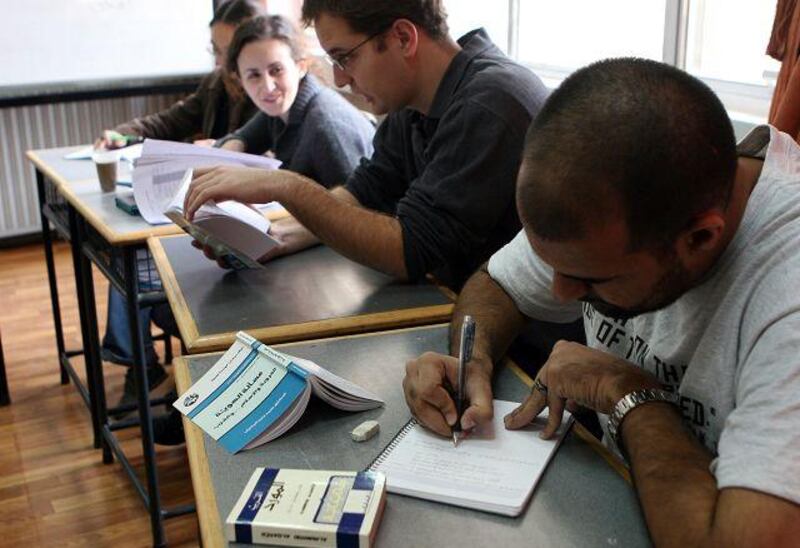DAMASCUS // When Lou Gough, a British student, arrived to spend a summer studying Arabic in the Syrian capital, she thought that having studied the language for three years she was, if not fluent, at least able to make herself understood. But like hundreds of other foreign students before her, Ms Gough found herself being able to discuss Israeli-Palestinian politics, but unable to order a coffee.
"We write essays on Ibn Battuta when we don't even know the names of animals," says Ms Gough, who started studying Arabic at Durham University in the UK. "It would be useful to know how to ask for directions or buy food." It is a common complaint among the international students who flock to Syria each year to study Arabic. Compared to textbooks in French and German, the vocabulary in most Arabic learning guides is heavily orientated towards political discourse. Georgetown University Press's Al Kitaab, a stalwart textbook among Arabic students, has often been criticised by students in this respect.
"I guess it's because much of the Arab world is so focused on the Israeli-Palestine issue and on resistance," says one student from Sweden. "No other language I have learnt has been that culturally imbued." But others attribute it to the divide between formal Arabic - Fusha - and the dialects. While Fusha is used as a pan-Arab language for writing, news broadcasts and formal occasions, each country has its own day-to-day dialect - known as Amiya. Almost all Arabic courses the world over focus solely, or at least predominantly, on Fusha.
"Fusha is not used to talk about everyday events, which is why students find this high-level vocabulary right from day one," says David Wilmsen, a professor of Arabic at Lebanon's American University of Beirut and a former professor at Georgetown in the US. Which means Damascus's students often compare speaking Fusha with Syrians to speaking Latin with Italians. "Here, I didn't have a clue what people were saying," says James Clark, another British student of Arabic. "At first I thought it was the Syrian accent, but then I realised that we were actually speaking different languages."
The obsession with formal Arabic is a historical anomaly combined with a pinch of elitism, say some experts. "Fusha means pure or eloquent language and there is a snobbery about learning 'proper' Arabic," says Prof Wilmsen. Prof Wilmsen also realised that Fusha was not teaching students everyday language. A few years ago he did a rough test using Arabic newspapers. Looking for the word "trousers" he did not come across it once in the course of a year. "But we all say the word 'trousers' on a daily basis," he says. "Students need to know words like that."
Concerned by the attitude towards dialect and students' lack of confidence when learning Arabic, Prof Wilmsen decided to pioneer teaching a dialect at the same time as Fusha at Georgetown, a policy he is now promoting at the American University in Beirut. "People want to be able to communicate," he says. "It makes them more motivated." There are now more widespread changes afoot in Arabic pedagogy. Universities report an ever-increasing interest in the language and more professors and linguists are being recruited to work in the field. This is leading to a discussion and modernisation of the teaching materials and methods.
Many universities both inside and outside of the Arab world have introduced material that better reflects the position of Arabic in international discourse. "Some of our teachers at Durham have started to use current events articles actually relevant to the Middle East today," says Ms Gough. 'It's a pleasant change from Al Kitaab, which is so dry and focuses on politics, or long rambling articles about poetry or theatre."
But Al Kitaab, too, is changing. The publisher is now producing a range of supplementary materials in Levantine, Moroccan and Gulf dialects, with an emphasis on teaching oral skills first. * The National





